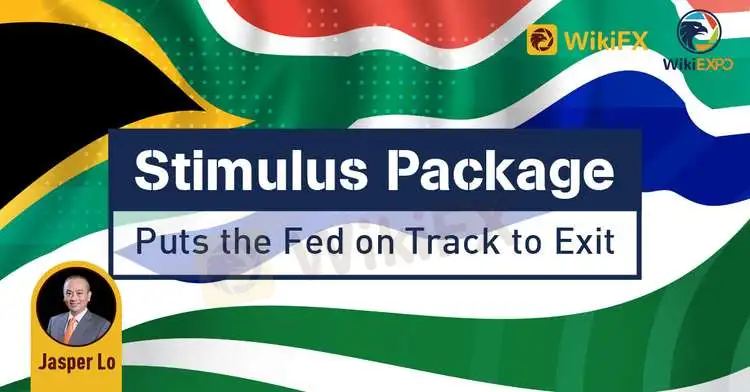简体中文
繁體中文
English
Pусский
日本語
ภาษาไทย
Tiếng Việt
Bahasa Indonesia
Español
हिन्दी
Filippiiniläinen
Français
Deutsch
Português
Türkçe
한국어
العربية
Stimulus Package Puts the Fed on Track to Exit| Influencer‘s Insight •Jasper Lo
Abstract:Talking points in the financial market - the US 10-Year Treasury yield, are expected to be replaced by the Fed's exit strategy soon. Its Chair Powell recently said in an interview that, the Fed might adopt contractionary monetary policy because it would dial back the purchase of bonds once the economy had all but fully recovered.

Talking points in the financial market - the US 10-Year Treasury yield, are expected to be replaced by the Fed's exit strategy soon. Its Chair Powell recently said in an interview that, the Fed might adopt contractionary monetary policy because it would dial back the purchase of bonds once the economy had all but fully recovered.
Despite the fact that raising interest rates is the most common approach to tighten monetary policy, the Fed and major central banks are all carrying out quantitative easing on a large scale. In this case, it will be processed in order by three steps: the market exit, rate hike, and balance sheet unwinding. Therefore, the Fed will exit the market first, reducing the bond-buying until the purchases stop. It may consider increasing the interest rates during the exit if the economy recovers substantially.

Past examples show that the Fed could launch loose monetary policies either in a foreshadowing or sudden manner. On the contrary, tight ones are always signaled in advance to avoid possible financial market shock. Generally speaking, the financial market will brew over relevant ideas first. Thus Powell's earlier suggestion this time is paving the way for the market exit in Q4.
Under the stimulus of Biden's $1.9 trillion economic rescue package, the country's economic indicators will have a high chance to embrace significant growth, further supporting the Fed's exit strategy. Nevertheless, the European Central Bank (ECB) will speed up the pace of bond buying in the second quarter of the year to stave off the adverse effect of the rising Treasury yields, said its chief Christine Lagarde. As a result, the central banks in the US and Europe will launch monetary policies in opposite ways, which sends an absolute advantage to the dollar at the expense of the euro.
Some analysts regard the large-scale economic stimulus program as a kind of pump-priming, which bodes well for gold but punishes the dollar. However, the economic stimulus plan of the Treasury Department is far different from the Fed's quantitative easing (QE). By taking such measures, the Fed aims to devalue the dollar to inspire the stock market, while the Department targets to catalyze the economy and create jobs. By this account, the stimulus package that brings about economic revival and full employment will help the central bank to gather pace in the three steps. With that said, the package will force the bank to reduce, rather than increase, QE measures.

The case makes sense if the Department uses the massive reserves to revitalize the economy with the purpose of hampering the dollar, but the fact is the Treasury Secretary Yellen has repeatedly indicated that a massive tax increase would be accepted to fund the stimulus package. Chances are the country will see a reduction in the budget deficit and a dynamic economic recovery, which all open the door to a strong dollar. In contrast, the euro and even gold could find no more impetus to move upwards.
Disclaimer:
The views in this article only represent the author's personal views, and do not constitute investment advice on this platform. This platform does not guarantee the accuracy, completeness and timeliness of the information in the article, and will not be liable for any loss caused by the use of or reliance on the information in the article.
Read more

Key Forex Strategies
New to forex trading and looking for simple and effective trading strategies? We got you covered! In this quick guide, we'll explain some of the key forex strategies which are easy to digest. So, let's start!

Fundamental vs Technical Analysis
Fundamental and technical analysis play some of the most influential and critical roles in making trading decisions amongst traders today. They are widely accepted by stock, foreign exchange, indices and cryptocurrency traders worldwide. Traders use either or both of the methods to make key trading decisions in their respective markets.

Going Short of JPY Is Boosted by Yellen’s Remark on Interest-Rate Hikes Again
When interviewed by Bloomberg, Yellen, the U.S. Treasury Secretary, indicated that the USD 4-trillion budget released by Biden would be beneficial to America even if it may increase inflation and interest rates.

Brent oil is predicted of bullish repricing by Goldman Sach
According to Goldman Sachs' head of energy research, a nuclear deal between the U.S. and Iran could send energy prices higher - even if it means more supply in the oil markets. Talks are ongoing in Vienna between Iran and the six world powers - the U.S., China, Russia, France, U.K., and Germany - trying to salvage the 2015 landmark deal. Officials say there's been progress, but the conclusion of the negotiations remains unclear and oil prices have been soaring as a result.
WikiFX Broker
Latest News
AIMS Broker Review
The Hidden Checklist: Five Unconventional Steps to Vet Your Broker
Russia to Fully Ban Crypto Mining in 10 Regions Starting January 1, 2025
YAMARKETS' Jingle Bells Christmas Offer!
Why is there so much exposure against PrimeX Capital?
Doo Financial Expands Regulatory Reach with Offshore Licenses in BVI and Cayman Islands
MTrading’s 2025 "Welcome Bonus" is Here
Doo Financial Obtains Licenses in BVI and Cayman Islands
CFI’s New Initiative Aims to Promote Transparency in Trading
Currency Calculator


